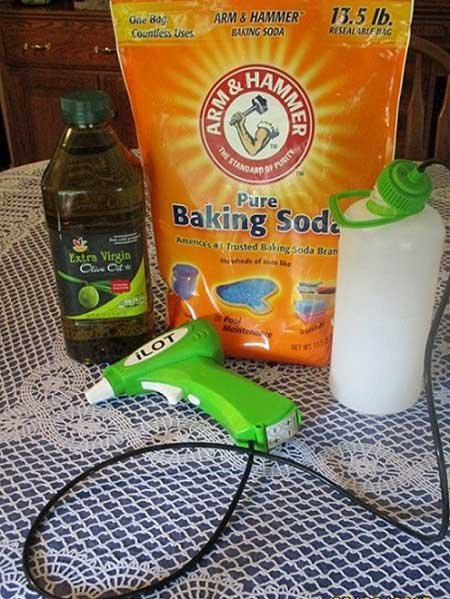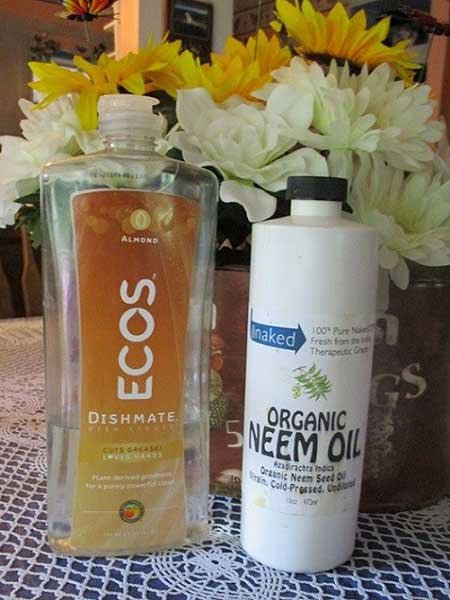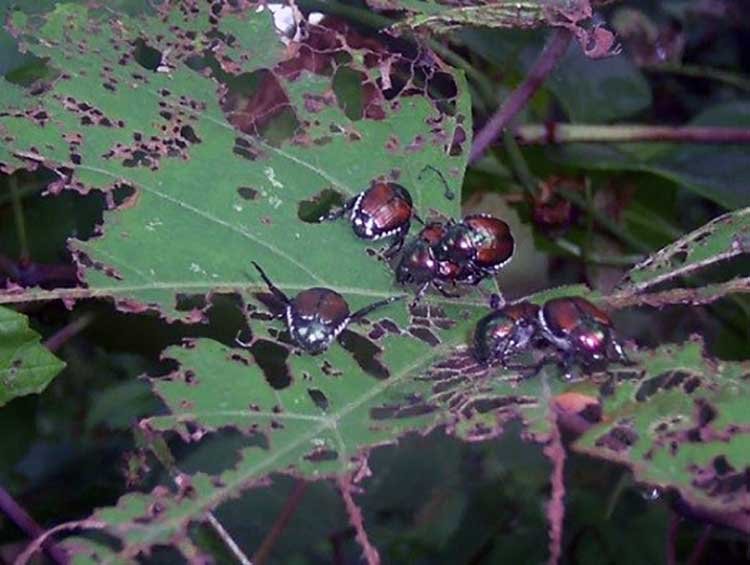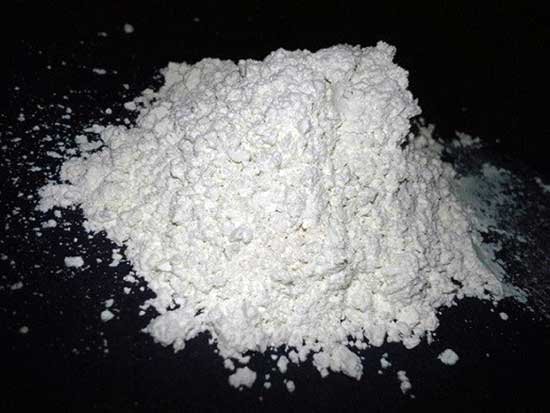I believe passionately in living our lives as naturally as possible and using natural non-toxic pest control. When gardening, I have found many alternatives to toxic pesticides that are healthier and safer than chemicals.
I want to share some of the best DIY natural solutions with you that I use and are very effective. These simple and easy homemade recipes also save you bundles of money.
My garden is grown organically and no chemicals are ever used whether it is fruits, vegetables, or flowers.
Here are 4 DIY recipes are that are:
- Easy to make
- Cheap
- Easy to use
Organic Baking Soda DIY Pesticide

A simple, all-purpose baking soda spray.
Baking soda is one of those multiple purpose garden remedies that is simple, inexpensive, and safe to use.
Ingredients
- 1 teaspoon of baking soda
- 1/3 cup of olive oil or cooking oil
- 1 cup of water
Mix all ingredients and put in a spray bottle. Shake thoroughly.
This spray works great to kill aphids, spider mites, and white flies, but it doesn't harm beneficial insects. It can be used on almost any type of vegetable or flower.
More baking soda pest control ideas to try:
- Sprinkle baking soda lightly and just occasionally around flower beds to discourage rabbits from nibbling on buds.
- To eliminate outdoor ants in their dirt mounds try sprinkling baking soda on the mound when it is damp. After about a half-hour, pour a small amount of vinegar on the ant hill. Ants will ingest the combination and their body enzymes will do the rest.
- Get rid of those pesky backyard slugs by sprinkling baking soda directly over the plants. This will kill them by drying them up quickly.
- Hand pick - tried and true method
- Iron phosphate - Makes snails and slugs stop eating and die after ingesting. Is organic and safe around pets and wildlife.
- Copper strips - When placed and wrapped around garden beds and pots it will keep them away. It does not kill them but when their bodies touch the copper it gives them an electric shock..
- Beer - Drown those pesky snails with a small amount of beer in a wide-mouthed jar. Bury it up to the neck in the soil and prop the lid up with a small stick to stop rain water from diluting the beer, but allow space for the snails and slugs to be trapped.
Homemade Insecticidal Soap
Ingredients
- 1 gallon of water
- 2 tablespoons of olive oil or vegetable oil
- 5 tablespoons of soap such as castile soap (make sure you don't use detergents or soaps that contain a degreaser or fragrances)
Mix all ingredients thoroughly and put in a spray bottle. Spray directly on insects and coat infested plant evenly and thoroughly. Check to make sure there is no sign of withering or browning on plants. If there are, discontinue use immediately.
This will work well on harmful insects such as white flies, mites, aphids, immature leaf hoppers, and thrips. How this remedy works is it dehydrates the insect and dissolve the exoskeleton from the fatty acids in the soap and oil.
Neem Oil Recipe

Concentrated neem oil and soap make a great pest spray.
Ingredients
- 1 gallon of water
- 4 teaspoons of organic cold-pressed virgin neem oil
- 1/4 teaspoon of eco-friendly liquid soap
Mix the soap and water and shake well then slowly add the neem oil while stirring constantly. Use a hand sprayer to apply over plants. Be sure to cover the plants entire foliage, including stem and underside of leaves where insects often hide, but try to avoid the buds or blossoms.
Quick Benefits of Neem Oil:
Neem oil is unique in that it kills insects at all stages — adult, larvae and egg. The active chemical in neem oil is azadirachtin which works a few different ways - an antifeedant, a disruptor, and by smothering.
Neem oil is a natural, plant-based, non-toxic, organic product that is a pesticide, fungicide as well as an insecticide.
Neem oil is effective that can help control and get rid of over 200 species of insects including mealy bugs, aphids, thrips, whiteflies, mites, and Japanese beetles.
Neem Oil for Japanese Beetles

Neem oil is a fantastic cure for Japanese beetles.
Neem oil is effective on Japanese beetles that have enormous appetites and eat quite a variety of flowers and plants -- one of the most common are roses. Spray as directed above and make sure to spray all around the soil of the plant to help destroy the larvae and eggs and the adult that are visible on the plant. I also hand-pick the Japanese beetles off your roses and other plants by taking a small jar with soapy water and throw them in the jar where they will drown and I dispose of them by flushing them down the toilet.
Diatomaceous Earth

This gift from Mother Nature is a wonderful and cheap pest prevention method.
Ingredients
- 2 cups diatomaceous earth
- 1 gal of water
Mix DE and water. Shake well! Spray it on plants, brush it on fruit trunks and limbs, fences, etc. Or Sprinkle DE powder with a duster in garden or where bugs are.
Use food grade diatomaceous earth in your garden for insect control. It is a natural safe product straight from Mother Nature. Basically, it's a powder made of fossilized diatoms millions of years old that kills any insect with its sharp edges. DE cuts the insect's exoskeleton and they dehydrate and die. It is deadly to any insect - kills hard bodied insects and soft-bodied larvae and it even kills termites, but is safe for earthworms.
Thanks For Reading!
If this is your first time reading my writing, thank you!
My name is Kevin and I run a website called Epic Gardening, where it is my goal to teach 1,000,000 people how to garden. This post went live on my site on October 5, 2017 at 9am.
Now that I've found Steemit, I'm going all in on this community and sharing as much as I can here. You'll find me writing about gardening, business, health, and philosophy - I can't seem to stick to one topic :P
Thanks and happy Steeming,

Kevin
